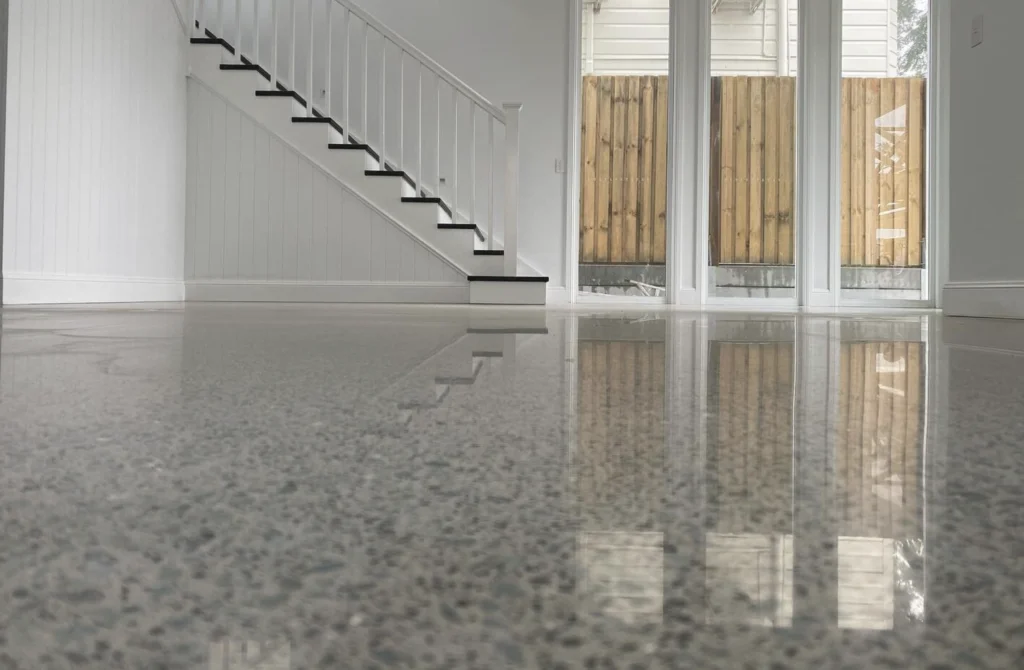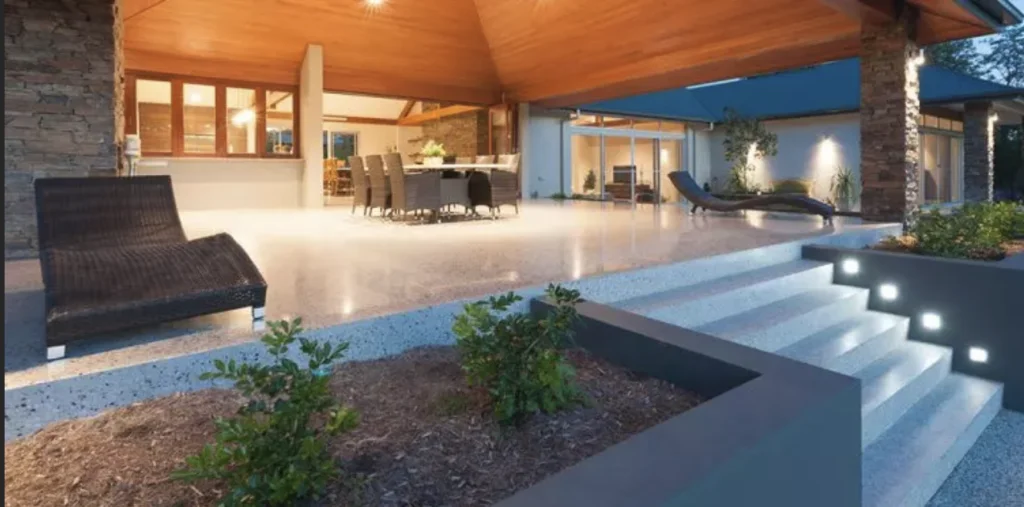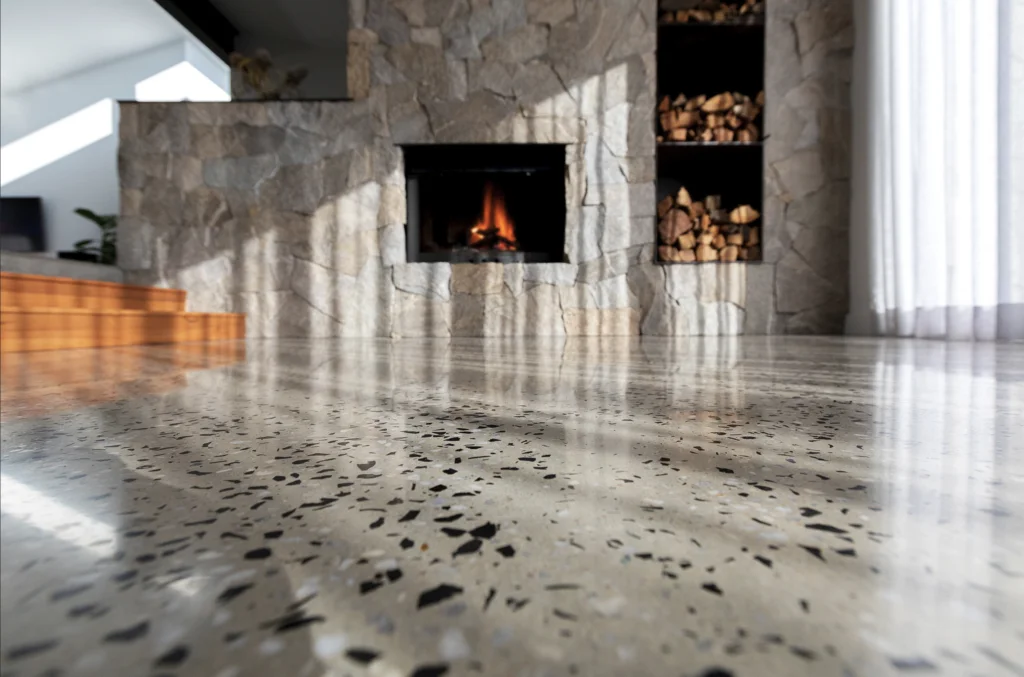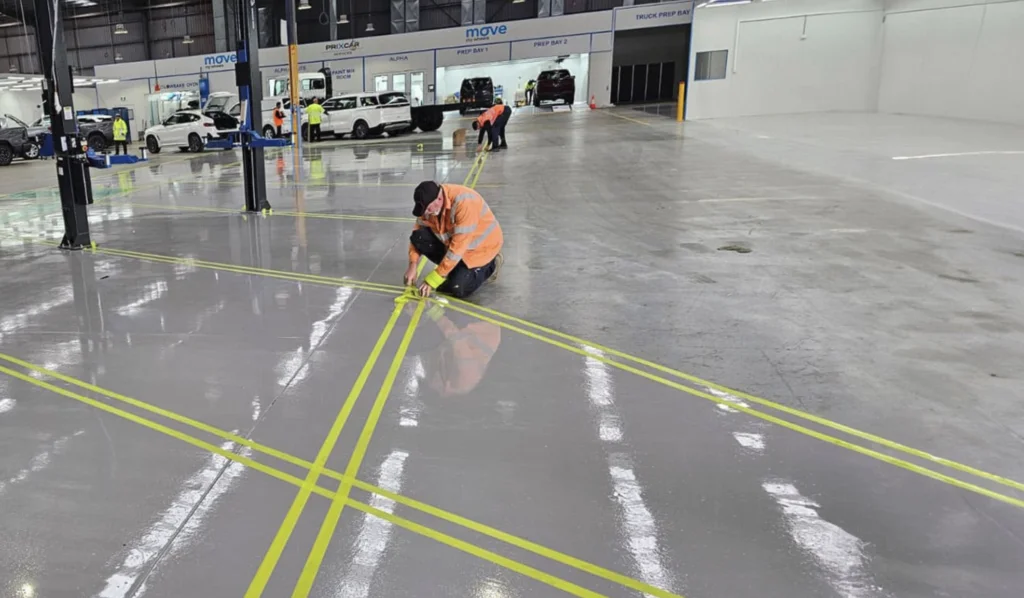Concrete flooring has evolved from being a basic foundation material to a versatile design element used in homes and commercial spaces alike. If you have an existing concrete floor and want to enhance its aesthetic appeal without replacing it, there are a variety of concrete floor finishes that can give it a high-end look. In this article, we’ll explore nine of the best concrete floor finishes that can transform your floors and make them stand out.
Concrete flooring is extremely durable, long-lasting, eco-friendly, and low-maintenance. Most buildings have concrete slabs as part of their foundation, and this material is often found beneath other floor coverings. In its natural state, concrete is usually gray, with a slightly mottled appearance. While this look works for some, others might prefer a more aesthetically pleasing finish for their concrete floors. Fortunately, a wide variety of concrete floor finishes are available that can provide a high-end, customized look, as well as additional protection against wear and tear.
In this article, we’ll discuss nine of the best concrete floor finishes that not only look great but also provide long-term benefits like durability and ease of maintenance.
1. Acid-Stained Concrete Floors
One of the most visually stunning finishes for concrete floors is acid staining. This process involves applying an acid-based solution that reacts with the concrete’s natural composition to create unique colors and patterns. Unlike surface coatings, acid stains penetrate the concrete, providing a more permanent effect.
Acid-stained concrete floors often feature a mottled, marbled appearance with colors ranging from earthy browns to rich greens and blues. The result is a one-of-a-kind floor that can elevate the look of any room. Acid staining can be expensive, typically costing around $25 per square foot, but the dramatic effect is often worth the price.
2. Concrete Floors with Faux Grout Lines

If you love the look of tile but want the durability of concrete, faux grout lines are a great option. By etching the concrete after staining, you can create a tiled appearance, mimicking materials like ceramic or stone. This gives the floor a more refined, high-end look without the need for actual tiles.
Etching designs can range from simple grids to more intricate patterns, making this a versatile option for those who want a custom floor design. Faux grout lines cost between $3 and $7 per square foot, making it an affordable way to get a tiled look.
3. Stained and Polished Concrete Floors
Stained and polished concrete floors have become a popular choice in modern homes, especially in industrial or loft-style designs. To achieve this look, the concrete surface is polished using progressively finer grit pads, resulting in a smooth, glossy finish.
Staining adds color to the polished surface, allowing you to customize the floor’s appearance. You can choose from a wide range of colors to match your interior design. Polished concrete is durable, easy to clean, and gives off a luxurious, high-end vibe.
4. Dyed Concrete Floors

Dyeing concrete is another way to add color to your floors, but unlike acid staining, dye does not react chemically with the concrete. Instead, it simply penetrates the surface to add pigment. This makes it a more predictable process, allowing you to achieve consistent, solid color throughout the floor.
Dye is available in a wide range of colors, from bold, bright hues to soft neutrals. However, since dye doesn’t offer as much color variation as acid stains, adding area rugs or other design elements can help soften the overall look. Expect to pay between $3 and $15 per square foot for dyed concrete floors.
5. Epoxy Painted Concrete Floors
Epoxy paint is an extremely durable and long-lasting finish for concrete floors, making it ideal for high-traffic areas. Epoxy comes in a wide range of colors and can be applied in solid colors or intricate patterns like checkerboards or custom designs.
The process involves mixing two parts—an epoxy resin and a hardener—that create a chemical reaction to form a hard, glossy surface. Epoxy-painted floors are easy to clean and resistant to stains, making them popular in garages, basements, and commercial spaces. You can expect to pay around $0.50 to $3 per square foot for epoxy floor finishes.
6. Faux Wood Finish Concrete Floors
If you love the look of hardwood floors but need the durability of concrete, a faux wood finish is the perfect solution. This process involves pressing a wood grain pattern into freshly poured concrete, then staining it in shades of brown or gray to resemble natural wood.
A faux wood finish provides the warmth and texture of wood with the long-lasting durability of concrete. This option typically costs $2 to $4 per square foot for DIY installations, making it an affordable and attractive choice.
7. Stamped Concrete Floors

Stamping concrete is a technique that can create the look of materials like stone, brick, or slate without the high cost. To achieve this effect, a patterned stamp is pressed into wet concrete, leaving behind an embossed texture.
Stamped concrete can be customized with a variety of colors and patterns, giving you endless design possibilities. While this technique requires some expertise, it can be done as a DIY project if you’re willing to put in the time and effort. The cost of stamped concrete floors typically ranges from $500 to $1,000 for materials.
8. Concrete Floor Stenciling
For those who prefer a more intricate design, stenciling is an excellent way to customize your concrete floors. Stenciling involves applying patterns with paints or dyes over a prepared concrete surface. This method allows for a wide range of design possibilities, from geometric patterns to floral motifs.
While stenciling can be done DIY, it’s important to properly prep and seal the floor to ensure the design lasts. Depending on the complexity of the design, stenciling can cost anywhere from $9 to $20 per square foot.
9. Microtopping Concrete Floor Finish
Microtopping is a great option if your concrete floors are damaged or unattractive. This process involves applying a thin layer of cement over the existing floor, which can then be stained, polished, or sealed to achieve the desired look.
Microtopping is a cost-effective way to refresh your concrete floors without a complete replacement. It typically costs between $3 and $7 per square foot and is suitable for both indoor and outdoor spaces.
Tips for Choosing the Right Concrete Floor Finish

When selecting a finish for your concrete floors, consider factors like texture, location, and budget. A smooth finish might work well in a modern living space, while a more rugged finish could be better suited for outdoor patios. Also, keep in mind the maintenance requirements of each finish, as some may need more frequent upkeep than others.
Conclusion
Concrete floors are not just a practical choice—they can also be a stylish one. With so many options for finishes, from acid staining to faux wood and epoxy, there’s a perfect solution for every taste and space. Whether you’re looking for something sleek and modern or rustic and warm, these finishes can elevate your concrete floors to a high-end look.
FAQs
1. What are the most durable concrete floor finishes?
Epoxy and polyurethane coatings are the most durable finishes for concrete floors, offering a hard, glossy surface.
2. What are the most budget-friendly options for concrete floors?
Paint and concrete dye are the most cost-effective options, providing a fresh look at an affordable price.
3. Can you DIY a concrete floor finish?
Yes, many finishes like epoxy painting, stamping, and staining can be done DIY, though some processes require experience for best results.
4. How long do concrete floor finishes last?
With proper care, concrete floor finishes can last for decades. Durability depends on factors like traffic, maintenance, and the quality of the finish.
5. Do concrete floors require regular maintenance?
Concrete floors are low-maintenance but may need periodic sealing, especially in high-traffic areas. Regular cleaning with a mild detergent is usually sufficient to keep them looking great.
